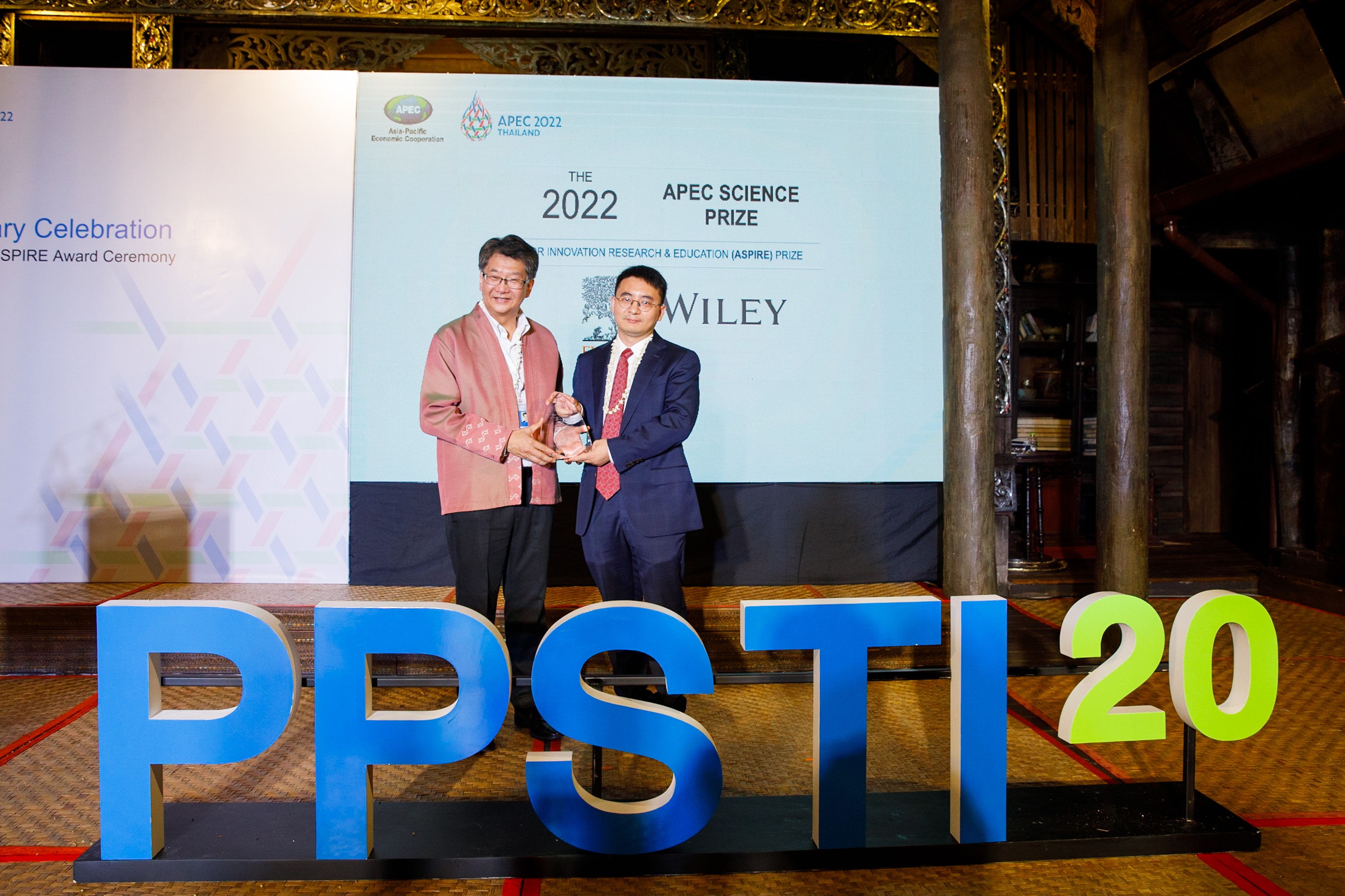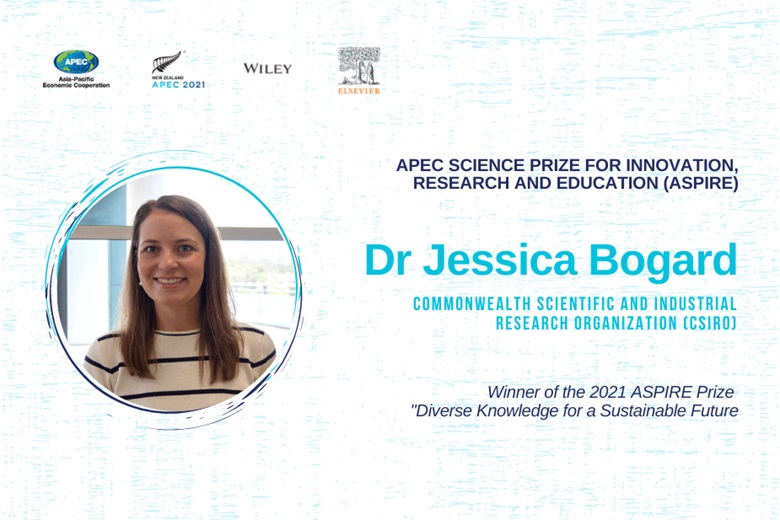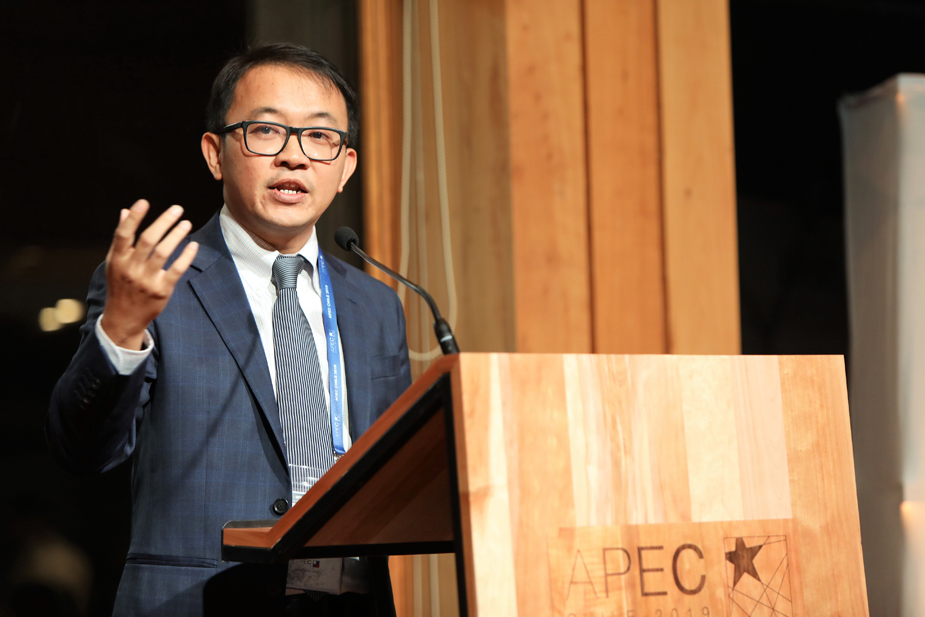Last page update:
The APEC Science Prize for Innovation, Research and Education
The APEC Science Prize for Innovation, Research and Education (ASPIRE) is an annual award which recognizes young scientists who have demonstrated a commitment to both excellence in scientific research, as evidenced by scholarly publication, and cooperation with scientists from other APEC member economies, including inclusive and interdisciplinary collaborations.
The ASPIRE Prize supports APEC’s mission to:
- Strengthen international science and technology networks;
- Enhance economic growth, trade and investment opportunities in harmony with sustainable development, through policies, innovative R&D and technologies, and knowledge sharing; and
- Improve linkages and efficiency between research and innovation.
ASPIRE 2023: INCLUSIVE SCIENCE, TECHNOLOGY, AND INNOVATION FOR A RESILIENT AND SUSTAINABLE ENVIRONMENT
Each year the APEC host economy is asked to provide a theme to guide nominations for the ASPIRE Prize to be awarded in their host year. For its host year of 2023, the United States selects the ASPIRE Prize theme: “Inclusive Science, Technology, and Innovation for a Resilient and Sustainable Environment.”
This theme focuses on advancing environmental resiliency and sustainability through science, technology, and innovation that centers on diverse perspectives, and promotes an inclusive scientific ecosystem. Unlocking the diversity of thought and experience can expand the boundaries of scientific knowledge, which is vital to fundamental research and underpins resilient and sustainable solutions to global environmental and societal challenges.
The theme highlights scientific research dedicated to inclusivity at all stages of career development. This goal additionally incorporates all facets of society in an effort to shape a more balanced world. This may include research that encourages the increased societal connectivity of underserved and marginalized populations, promotes self-sustaining ecosystems, or achieves solutions to mitigate public health risks. Action toward this end may take various forms: enhancing climate mitigation and resilience; reducing disaster risk; promoting food security, safety, and agriculture biotechnology; tackling environmental challenges; or fostering an enabling environment to accomplish these goals. Nominees should demonstrate a commitment to excellence in scientific research and cooperation with scientists from other APEC member economies, including inclusive and interdisciplinary collaborations in subjects such as: biology, oceanography, chemistry, environmental science, public health, economics, data sciences, social sciences, and other relevant fields.
ELIGIBILITY
Any citizen of an APEC member economy is eligible to be nominated for the ASPIRE Prize. He/she must be at the time of his/her nomination and be under the age of 40 as of 31 December of that year (i.e., all 2023 nominees must be under the age of 40 as of 31 December 2023).
SELECTION PROCESS
Each member economy, through its representative on the APEC Policy Partnership for Science, Technology and Innovation (PPSTI), is invited to nominate one young scientist under the age of 40 to be considered for the 2023 ASPIRE Prize.
Applicants are encouraged to complete the ASPIRE 2023 Nomination Form and send it to the Program Director of PPSTI at [email protected] and to Ms. Karen Kwan ([email protected]) by 28 April 2023 so that nominations may be directed towards local economy reviewers.
Once nominations are received, PPSTI members rank the nominees through a selection ballot to determine the winner. PPSTI members are asked to judge the nominees based on how well they have demonstrated:
- Excellence in scientific research, as evidenced through scholarly publication;
- Commitment to cooperation with scientists from other APEC member economies; and
- Contribution to the theme of “Inclusive science, technology, and innovation for a resilient and sustainable environment.”
The winner will be recognized at an award ceremony during the APEC PPSTI Meeting hosted by the United States tentatively scheduled for August 2023.
ASPIRE PRIZE SPONSORS
Wiley and Elsevier, two of the world’s leading publishers of scholarly scientific knowledge, have generously committed to funding prize money in the amount of $USD 25,000.
ASPIRE PRIZE WINNERS
 | 2022: Transformation to a Bio-Circular-Green Economy Dr Jingzheng Ren, an industrial and systems engineer from Hong King, China, was awarded the 2022 ASPIRE Prize at an in-person ceremony in Chiang Mai, Thailand. Dr Ren is an Assistant Professor at the Hong Kong Polytechnic University. His research is focused on decision-making for economic, industrial, and social systems. He has developed new methods to promote harmonious development of the economy, environment, and society. He has collaborated with scientists in 12 APEC economies and has been published in over 183 scientific journals. | |
 | 2021: Diverse Knowledge for a Sustainable Future Dr Jessica Bogard, a dietitian and public health nutritionist from Australia, was awarded the 2021 ASPIRE Prize, for her research focusing on boosting the potential of underutilized local and indigenous food to reduce malnutrition, particularly
among pregnant women and young children. Dr. Bogard pioneered the development of a database of nutritional quality of more than 50 species of fish and aquatic food and found that certain indigenous species of fish are rich sources
of a multitude of micronutrients, but their availability is declining. She is a research scientist at the Commonwealth Scientific and Industrial Research Organisation (CSIRO) Australia.
| |
 | 2020: Biodiversity for a Prosperous Economy Dr Huai Chen was awarded the 2020 ASPIRE Prize at an online ceremony by Dr Siti Hamisah Tapsir, Secretary General, Ministry of Science, Technology and Innovation (MOSTI) Malaysia. Dr Chen is a professor at Chengdu Institute of Biology, Chinese Academy of Sciences. His research is focused on wetland biodiversity and nature’s contribution to people. Dr Chen’s findings lead to a better understanding of
these wetlands including protecting, developing new generation models for methane emissions and enhancing assessment of carbon storage and ecological value. | |
 | 2019: Smart Technolgies for Healthy Societies Dr Yun Hau NG was awarded the 2019 ASPIRE Prize in Puerto Varas, Chile by Dr Nicole Ehrenfeld, Director, Scientific Initiative Millennium, Ministry of Economy, Chile. Dr Ng is an associate professor at the School of Energy and Environment,
City University of Hong Kong, China. His research is focused on the development of highly efficient photocatalytic systems to mimic natural photosynthesis to produce clean hydrogen from water. In short, he uses sunlight to split water
into clean hydrogen. | |
 | 2018: Smart Technologies for Healthy Societies Dr Madhu Bhaskaran of Australia was awarded the 2018 ASPIRE Prize in Port Moresby by Hon. Pila Niningi, Minister for Higher Education, Research, Science and Technology of Papau New Guinea. Dr Bhaskaran is a professor at RMIT University,
Melbourne, Australia where her work transforms the way we imagine, use and interact with electronic devices and sensors. She has developed ways to combine functional oxide materials processed at high temperatures with elastic and plastic
materials. Her work has led to the development of wearable elastic electronics and sensors, including gas and UV sensors and flat optical devices—all of which are stretchable, optically transparent and as thin as a nicotine patch. | |
 | 2017: New Material Technologies Dr Yanwu Zhu of China was awarded the 2017 ASPIRE Prize in Ha Noi by Deputy Minister of Science and Technology of Viet Nam, Tran Quoc Khanh. Dr Zhu is a Professor at the University of Science and Technology of China where he researches
the fields of nanomaterials and specifically new carbon materials. His publications have been widely cited and his research with other APEC scientists has been applied in large-scale production of graphene materials.
| |
 | 2016: Technologies for Food Security Dr Hua Kuang of China was awarded the 2016 ASPIRE Prize in Lima by Dr Gisella Orjeda, President of the Peruvian National Council for Science, Technology and Technological Innovative (CONCYTEC). Dr Kuang is a Professor at Jiangnan University’s
School of Food Science and Technology in Wuxi, China, where she works with researchers in other APEC economies to develop low-cost biosensors that detect food sanitation hazards. Her patented technologies have been used to improve
food safety for millions in China and elsewhere. | |
 | 2015: Disaster Risk Reduction: Understanding the Role of Climate Change and Variability Dr Jong-Seong Kug of Korea was awarded the 2015 ASPIRE Prize in Manila by Secretary Mario Montejo of the Philippine Department of Science and Technology. Dr Kug is an Associate Professor at Pohang University of Science and Technology’s
School of Environmental Science and Engineering in Korea, and his El Niño prediction model has helped the Korea Meteorological Administration better understand tropical climate dynamics, and forecast and track extreme weather—an
area that addressed Philippines’ theme of “Disaster Risk Reduction: Understanding the Role of Climate Change and Variability.” | |
 | 2014: Intelligent Transportation Dr Agachai Sumalee, a Thai professor at the Hong Kong Polytechnic University, was awarded the 2014 ASPIRE Prize by Cai Jianlin, China’s Vice Minister of Science and Technology. China selected the theme of “Intelligent
Transportation”to reflect China’s interest in facilitating green and sustainable growth, environmental protection and low-carbon economies. Dr Sumalee designed a model in collaboration with researchers from across the APEC
region that allows highway managers to predict traffic conditions and prevent congestion. This led to ground breaking road traffic management system that slashed commuting times in the greater Bangkok area. | |
 | 2013: Sustainable Ocean Development In 2013 the ASPIRE Prize was awarded by Gusti M. Hatta, Indonesia’s Minister of Research and Technology, to Dr Carissa Klein of Australia. Dr Klein’s research with the University of Queensland uniquely addressed the 2013 ASPIRE
nominating theme of “sustainable ocean development” by striking a balance between biodiversity conservation and socioeconomic viability. Her work has helped two APEC member economies—Malaysia and the United States—sustainably
zone the ocean for fishing and conservation. | |
 | 2012: Health Innovation Dr Rossa Wai Kwun Chiu of Hong Kong, China was awarded the 2012 ASPIRE Prize. Russia selected “health innovation” as its ASPIRE nominating theme, building on it desire that APEC actively foster cooperation among economies in
major innovation areas, such as human health, to support healthy lifestyles, productivity and economic growth. Dr Chiu’s groundbreaking research and innovations in chemical pathology has brought non-invasive prenatal diagnosis
of fetal genetic diseases into routine clinical use around the world. | |
 | 2011: Green Growth In 2011 the ASPIRE Prize was awarded by Nobel Laureate and U.S. Secretary of Energy Steven Chu to Dr Ali Javey of the United States. The United States selected “green growth” as its ASPIRE nominating theme, building on
its desire that APEC actively promote environmentally sustainable economic growth and development, and help our economies successfully transition to a clean energy future. Dr Javey’s innovative work with nanomaterials has
made great strides in developing a new generation of solar energy technology and reducing energy consumption in “green electronics.” | |

